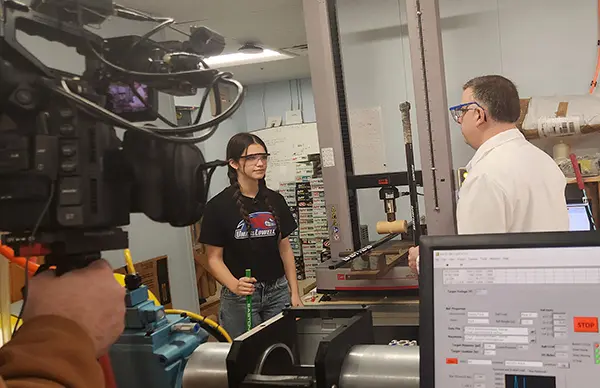 Image by Nancy Cicco
Image by Nancy Cicco
UMass Lowell’s Patrick Drane, assistant director of the Baseball Research Center, demonstrates the strength of a hockey stick with “NESN Clubhouse” show host, Bella.
Sailing a baseball over the Green Monster for a grand slam. Slapping a puck into the back of the net at 98 mph. Serving up an overhead smash just outside a pickleball court’s “kitchen.”
Amateur, collegiate and professional athletes dream of such feats and relentlessly practice to perfect them.
UMass Lowell studies the science that makes them possible.
Together with the university’s new sports engineering minor, UMass Lowell’s Baseball Research Center is expanding its services to meet the needs of more students, athletic leagues, equipment manufacturers and players, to enhance the performance of all.
For years, the center has been the primary equipment testing lab for Major League Baseball. Now, it’s embracing pickleball – the latest sport to capture the imagination of players young and old – through a partnership with the United Pickleball Association of America and Pickle Pro Labs. Together, the collaborators are developing testing standards for the sport’s equipment. The center is also branching out into hockey, incorporating the study of the game’s gear to serve more clients.
Nested under UMass Lowell’s Sports Collaborative for Open Research and Education (SCORE), the lab’s growth is creating a buzz on campus and beyond. Established by Francis College of Engineering Dean James Sherwood more than two decades ago, the center is providing students with more opportunities to conduct research as the lab elevates its game.
“Sports needs engineers and scientists to service the industry,” says Patrick Drane ’00, ’03, ’24, the center’s assistant director. “There is a large and growing sector in which students can land jobs, be it in athletic stadium design, sporting goods manufacturing or broadcasting. Whether they are athletes or fans, UMass Lowell’s offerings are a really good way for students to launch their careers that tap into their affinity for sports.”
Imad Hankour, an industrial engineering major who commutes to campus from Nashua, New Hampshire, will graduate in May. He says his work in the center “directly aligns” with his goal of entering the manufacturing or engineering industry by providing hands-on experience in data analysis, material testing and quality assurance.
Hankour’s contributions to testing baseballs for MLB has made an important impact on his college experience.
“I love being able to combine my passion for engineering and sports in a unique way, gaining a deeper understanding of sports from an engineering perspective. The lab has also given me a strong sense of belonging within the UMass Lowell community,” he says. “I have met lifelong friends, and we have built a close-knit team.”
About a dozen other UMass Lowell undergraduate students work in the center, says Drane, while another group of students is using the lab to assist with capstone projects ahead of graduation. Through SCORE, students may also land internships and cooperative education placements with industry leaders that let them bring their skills to the sports workforce.
The Baseball Research Lab’s expanding portfolio has been gaining attention in the sports sector. Earlier this year, New England Sports Network’s “NESN Clubhouse,” a show that engages young viewers in the history, culture and science behind sports, stopped by the center to spotlight the excitement behind the lab’s growth. The results can be seen in show segments based at UMass Lowell and interviews with Drane that explored how much “flex,” or pressure, hockey sticks can withstand and how an airborne puck can deform after hitting a solid object.
“Scientific concepts are often taught using examples from sports, because they are so relatable,” he says.
They also bring the fun, as does a unique “hockey crossover” with the PWHL’s Emily Brown, a defender with the Boston Fleet. Brown, who plays home games with the team at the Tsongas Center at UMass Lowell, holds bachelor’s and master’s degrees in mechanical engineering from the University of Minnesota. Drane invited her to become one of the center’s researchers last year, once the team laced up in Lowell.
“Due to the nature of my career as a professional hockey player, I am currently unable to work as a full-time engineer,” she says. “In my post-hockey career, I have always been interested in pursuing sports engineering, and becoming involved with the Baseball Research Center allows me the unique opportunity to gain firsthand experience in this specific field.”
Brown also believes the research helps her as an athlete.
“Working in the center allows me an outlet outside of hockey to grow and develop my analytical mindset in a different way, while also using and improving upon problem-solving skills. I feel this allows me to show up as a more refreshed and well-rounded athlete at the rink,” she says.
